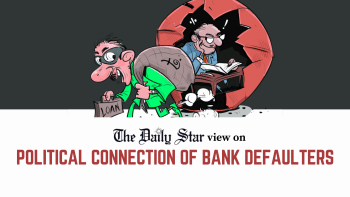Stop the downward economic spiral

S&P Global's downgrading of Bangladesh's long-term sovereign rating from BB- to B+ is but another indication that while the nation's focus has been trained on ensuring justice for the lives lost in recent violence, the economy continues to take a hit because of the government's failure to resolve this crisis. Following the unrest that resulted in the death of so many individuals, a five-day complete internet blackout, and subsequent curfew imposition, many economic sectors have struggled to bounce back even after the situation has become less tense. The lack of internet connectivity has particularly hurt IT and business-processing outsourcing firms and export-oriented industries. Even the S&P, alongside citing persistent pressure on Bangladesh's external metrics, particularly the decline in foreign exchange reserves, also mentioned in its report how the government is grappling with widespread protests, and that the "highly concentrated political environment" may undermine the predictability of future policy responses.
The S&P downgrade is significant as it may erode confidence in our economy among investors and businesses, and could directly affect Bangladesh's foreign direct investment (FDI) prospects. It may also result in interest rates for foreign loans rising. This means that the economy faces a double whammy as it tries to stay on the path to recovery from a 9.7 percent inflation and a 35 percent reduction of foreign exchange reserves over two years. This path has been beset by problems predating the recent unrest.
For example, on the back of a statistical mismatch of export data between two major sources, Bangladesh Bank published revised figures in early July, and the S&P report mentioned that exports have declined 5.9 percent in FY24. While remittance inflow grew by 10.7 percent in the same period, the latest data from the central bank shows that remittance inflow in the first 28 days of July was 16 percent lower compared to the full month of July a year ago, and 35 percent lower compared to June this year. Recent events have but exacerbated all these longstanding issues, highlighting once again that the economy is structurally unprepared for instability.
One may recall that Moody's previously downgraded Bangladesh's sovereign credit rating in May 2023, citing heightened external vulnerability and persistent liquidity risks, as well as institutional weaknesses. Another global credit rating agency has now downgraded Bangladesh a year on, which indicates that the authorities have failed to take lessons from the previous setback. As things stand, any economic recovery cannot be even started without first resolving the ongoing crisis through ensuring justice for those killed in the protests. So the authorities must take the latest rating downgrade with the seriousness that it deserves.


 For all latest news, follow The Daily Star's Google News channel.
For all latest news, follow The Daily Star's Google News channel. 









Comments